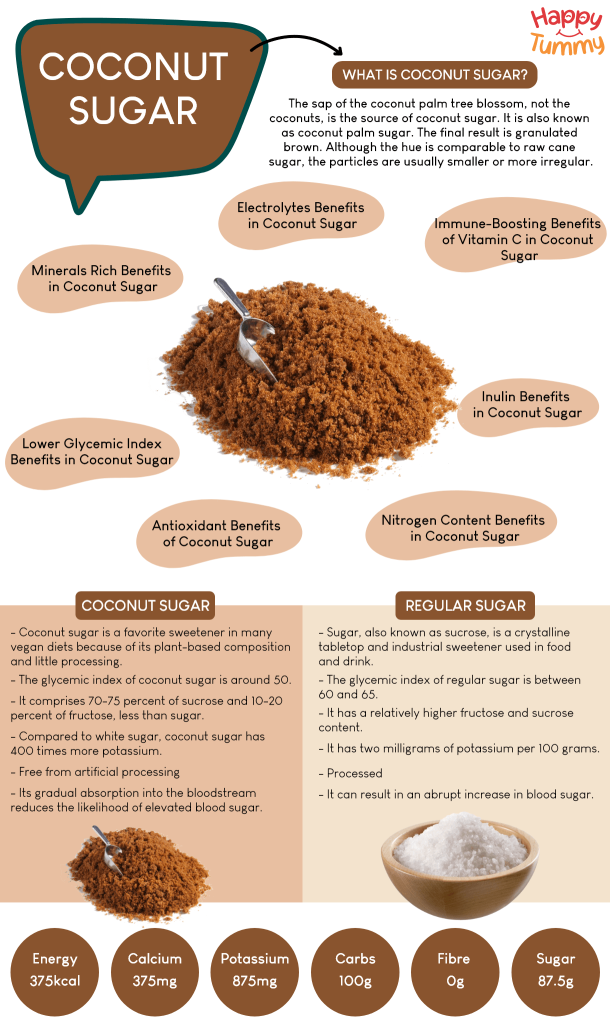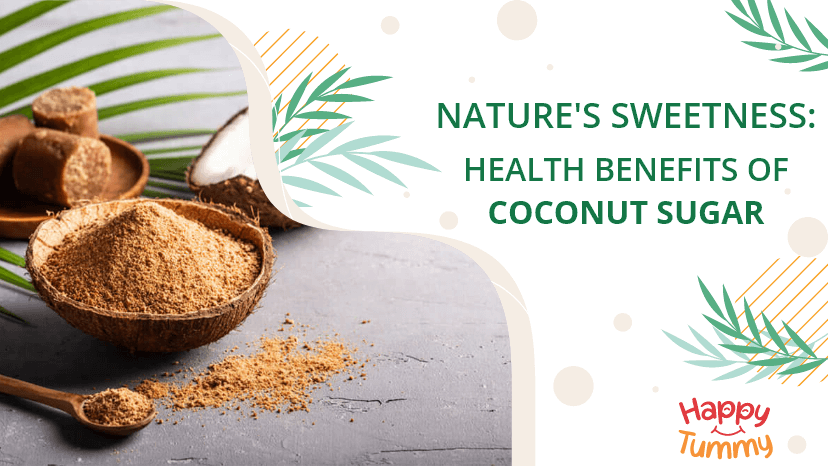Table of Contents
Most of us have a sweet craving, so we frequently indulge in a little sweet after every meal. But being health conscious, we always get anxious before indulging in the sweetness of the desserts. However, does it imply you can’t occasionally give in to your sweet tooth?
- Good news: coconut palm sap has covered your sweet tooth. Recently, chefs, home cooks, and health-conscious people have been all over coconut sugar.
This delicious sugary item prevents you from eating processed sugars while satisfying your sweet tooth. But is nariyal cheeni beneficial for your weight management goals?
Let us find out if coconut sugar, also known as “nariyal cheeni” in Hindi is good for you or if it is all a myth!
Read on to discover more about this amazing option.
What is Coconut Sugar?
The sap of the coconut palm tree flowers is the source of coconut sugar. It is also known as coconut palm sugar. There are two natural steps in the making of nariyal cheeni:
- A cut is made on the coconut palm bloom, and containers are filled with the liquid sap.
- Heat is applied to the sap until the majority of the water evaporates.
The final result is granulated brown. Although the hue is comparable to raw cane sugar, the particles are usually smaller or more irregular.
Coconut Sugar vs. Regular Sugar
Regular table sugar provides “empty” calories. However, when making coconut sugar, a sizable amount of the nutrients found in the coconut palm are maintained.
The minerals iron, zinc, calcium, and potassium, as well as phytonutrients like antioxidants and polyphenols, are the most notable of these [1].
Coconut sugar contains only roughly 75% sucrose, whereas regular table sugar is 100% sucrose. The remaining 25% comprises fiber, nutrients, and other “good stuff[2].” You’re getting more nutrients and consuming less “bad stuff” for the same quantity of conventional sugar.
However, like conventional sugar, nariyal cheeni is extremely high in calories (100 grams contains 375 calories)[3]. Because nariyal cheeni is plant-based and lightly processed, it is a common sweetener in vegan diets.
Still, nariyal cheeni is more nutrient-dense than ordinary table sugar because it is a natural sweetener derived from plants.
Refer to the table below for the gist on coconut sugar vs. regular sugar[4]:
| Coconut Sugar | Regular Sugar |
| Coconut sugar is a favorite sweetener in many vegan diets because of its plant-based composition and little processing. | Sugar, also known as sucrose, is a crystalline tabletop and industrial sweetener used in food and drink. |
| The glycemic index of coconut sugar is around 50.[3] | The glycemic index of regular sugar is between 60 and 65. |
| It comprises 70-75 percent of sucrose and 10-20 percent of fructose, less than sugar. | It has a relatively higher fructose and sucrose content. |
| Compared to white sugar, coconut sugar has 400 times more potassium. | It has two milligrams of potassium per 100 grams. |
| Lightly processed | Processed |
| Its gradual absorption into the bloodstream reduces the likelihood of elevated blood sugar. | It can result in an abrupt increase in blood sugar. |
Coconut Sugar Nutrition Information
Many minerals, primarily iron, zinc, calcium, and potassium, are still in nariyal cheeni derived from coconut palms. While there are several ways in which these nutrients may help the body, the amount found in a serving of nariyal cheeni is insufficient to provide a noticeable advantage.
100 gm of coconut sugar contains the following[5]:
| Nutrient | Amount per Serving |
| Energy | 375kcal |
| Calcium | 375mg |
| Potassium | 875mg |
| Carbohydrates | 100g |
| Fibre | 0g |
| Sugar | 87.5g |
Potential Health Benefits of Coconut Sugar

#1 Electrolytes and Hydration Benefits
Balanced electrolytes are necessary because they guarantee the heart, nerves, and muscles function correctly.
Further, coconut sugar’s potassium, magnesium, and sodium content is high, which aids in controlling the body’s water balance. Regarding trace elements, 100 g contains 625 milligrams (mg) of potassium and 125 mg of sodium[6].
#2 Minerals Rich Benefits in Coconut Sugar
Coconut sugar contents, which include calcium, iron, thiamine and zinc, provide numerous health advantages, including stronger bones. Minerals are necessary to efficiently operate the heart, brain, muscles, bones, and heart in a healthy body[7].
Good thiamine content may also assist the body in converting food into energy. It may also maintain overall heart health, and improve immunity
#3 Immune-Boosting Benefits of Vitamin C
Vitamin C, also found in nariyal cheeni, is most prominent for strengthening your immune system and supporting skin and joint’s wellness[9]. Vitamin C may destroy harmful bacteria, boost the number of white blood cells, and guard against oxidative stress.
#4 Antioxidant Benefits of Coconut Sugar
The antioxidants in nariyal cheeni prevent the body’s cells from oxidizing and may slow aging [9]. In addition to helping with illness prevention and oxidative stress reduction, antioxidants also enhance mental and cognitive function, inflammatory reduction, and skin health.
#5 Inulin Benefits in Coconut Sugar
Inulin, which is essentially a kind of dietary fibre that supports digestive health, may be found in in nariyal cheeni. It also aids in enhancing metabolism and gut health.
Inulin in nariyal cheeni may also help in preserving a normal blood sugar level[10].
Aashirvaad Atta, with Multigrains and a team of knowledgeable nutritionists, created the My Meal Plan test to calculate your daily fibre consumption and generate a meal plan that meets suggested intake guidelines.
#6 Lower Glycemic IndexBenefits
Because coconut sugar has a lower glycemic index (GI) than ordinary sugar, its effects on blood sugar levels are felt more slowly. Table sugar has a GI of about 60–70, whereas nariyal cheeni has a GI of about 35–54[11].
Those who need to control their blood sugar may find coconut sugar helpful.
Overall, nariyal cheeni is a great source of instant energy. It may help fight anxiety and manage nausea and hypoglycemia.
If you are unclear on what GI is, refer to our insightful blog “Understanding Glycemic Index: The Key to Healthy Eating” and learn about GI in detail.
The Weight-Management Benefits of Coconut Sugar
You know coconut sugar is healthy, but can you manage weight with coconut palm sugar? Not only is coconut palm sap sugar a delicious sweetener, but it may also be a helpful tool for managing weight. However, you need to combine it with a good diet and an active lifestyle.
Its low GI is a significant component in its reputation as a weight-friendly food. This gentler rise in blood sugar may lead to several weight-management benefits:
- Decreased Cravings: Controlling blood sugar levels may help reduce cravings for sweets, which may help you lose weight by avoiding unhealthy snacking.
- Increased Satiety: Nariyal cheeni digests more slowly and releases energy more slowly than other sugars, which may help you feel fuller for longer. You may control portion sizes and prevent overeating by doing this.
Caution…It is still sugar.
If you consume in excess, any sugars may contribute to a variety of ailments, including metabolic syndrome, obesity, diabetes, and heart disease. The health benefits of coconut sugar should be substantially the same as table sugar’s, despite the latter’s slightly superior nutritional profile.
Just like with ordinary table sugar, use nariyal cheeni sparingly. You can consult Aashirvaad’s expert dieticians to know how much sugar can you take depending on you rspecific health conditions and lifestyle!
The Bottom Line
Coconut sugar is not a miracle food. It is pretty similar to ordinary table sugar, albeit with less processing and trace levels of nutrients. Use nariyal cheeni sparingly if at all possible.
It has a consistency similar to brown sugar, so when cooking or baking, give it more time to dissolve or mix with other ingredients.
Nariyal cheeni works just as well in recipes for cane sugar, such as your go-to vegan treat or morning coffee. So get some nariyal cheeni the next time you’re in the mood for something sweet. It will satisfy desires without sacrificing health.
You can consult a health expert to understand any health-related issues. Schedule a 45-minute appointment with our professional nutritionist to receive a customized nutrition plan created just for you.
Frequently Asked Questions
Coconut palm sugar, when used as a sugar substitute, has a low glycemic index; however, because it has the same caloric and nutritional content as ordinary sugar, it should be treated similarly.
It has sodium, potassium, and magnesium, which are necessary for controlling your body’s various heart, neuron, and muscle activities, as well as water. It has over 400 times the potassium of ordinary sugar.
With their unique tastes and possible health benefits, coconut sugar and sugarcane jaggery are natural substitutes for refined sugar. Their decision ultimately comes down to nutritional requirements, culinary applications, and personal taste preferences.
The calories in coconut sugar are the same as in other sugars, refined or not. If you enjoy the flavour or it works well in your recipe, go ahead and use it, but use it sparingly and handle it just like any other sugar.
If stored properly, unopened nariyal cheeni can last for up to two years. It will endure roughly 12 to 18 months once it is opened. You might consider storing it in an air-tight container.
















